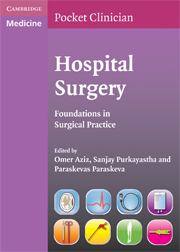Book contents
- Frontmatter
- Contents
- List of contributors
- Foreword by Professor Lord Ara Darzi KBE
- Preface
- Section 1 Perioperative care
- Section 2 Surgical emergencies
- Section 3 Surgical disease
- Section 4 Surgical oncology
- The cancer multidisciplinary team
- Tumour types
- Principles of chemotherapy
- Radiotherapy in cancer treatment
- Palliative care
- Section 5 Practical procedures, investigations and operations
- Section 6 Radiology
- Section 7 Clinical examination
- Appendices
- Index
Tumour types
Published online by Cambridge University Press: 06 July 2010
- Frontmatter
- Contents
- List of contributors
- Foreword by Professor Lord Ara Darzi KBE
- Preface
- Section 1 Perioperative care
- Section 2 Surgical emergencies
- Section 3 Surgical disease
- Section 4 Surgical oncology
- The cancer multidisciplinary team
- Tumour types
- Principles of chemotherapy
- Radiotherapy in cancer treatment
- Palliative care
- Section 5 Practical procedures, investigations and operations
- Section 6 Radiology
- Section 7 Clinical examination
- Appendices
- Index
Summary
Tumours can be classified as benign or malignant. Benign tumours are slow growing, retain normal cell morphology and do not invade tissue or metastasize. They tend not to cause damage to neighbouring structures unless compressive in nature, secondary to being large, or in a critical site e.g. brain, spinal cord. The cardinal characteristics of malignant tumours are their ability to invade and metastasize.
If a malignant tumour remains localized, surgery is the mainstay of curative treatment. Radiotherapy and chemotherapy can be added to reduce the risk of recurrence. If a tumour has metastasized, treatment typically consists of chemotherapy and radiotherapy and, except in the case of highly treatment-sensitive cancers such as testicular and lymphomatous cancers, treatment is palliative.
Tumours can be divided broadly into three sites of origin: epithelial, mesenchymal and haemopoietic. Rarely, tumours can be of mixed origin. Over 80 % of tumours are epithelial in origin. Epithelial malignant tumours are generally named carcinomas and those of mesenchymal origin, sarcomas. The table shows a classification of benign and malignant tumours according to site of origin.
Carcinoma in situ (CIS)
Tumours typically progress from normal cells to premalignant change, to cancer and then on to local invasion and metastatic spread. The premalignant stage is characterized by abnormal (dysplastic) cells that have not transgressed the basement membrane. If left, dysplastic cells may invade and progress to malignancy. Often carcinoma in situ (e.g. of cervix, CIS, or of breast ducts, DCIS) is actively treated to prevent progression to frank malignancy.
Grading
Tumours are graded by the histopathologist. This enables the surgeon and oncologist to stratify the tumour into prognostic groups to aid with tailoring of treatment according to risk of relapse.…
- Type
- Chapter
- Information
- Hospital SurgeryFoundations in Surgical Practice, pp. 571 - 574Publisher: Cambridge University PressPrint publication year: 2009



